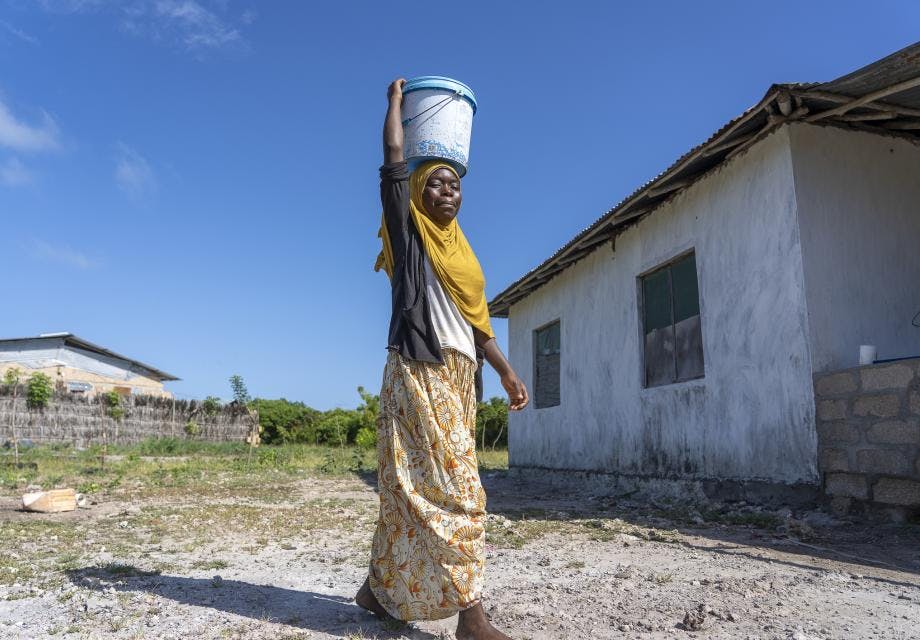Why action is needed on female genital schistosomiasis
Hester Phillips
27 October 2022
Interviews with healthcare workers in Zanzibar reveal a lack of knowledge and equipment to diagnose the disease, risking serious consequences for women’s health, including HIV
Female genital schistosomiasis can increase women and girls’ risk of HIV and cervical cancer and other serious reproductive health issues. But healthcare workers are often unaware of the condition, as research from Zanzibar shows.
What is the research about?
Female genital schistosomiasis (FGS) is a gynaecological condition caused by the parasitic infection schistosomiasis. Snails that live in freshwater, such as lakes, rivers or ponds, carry blood fluke worms which can penetrate human skin and get into the body. In women, they can then affect the female genital areas causing inflammation, open sores and bleeding on the cervix and vagina.
Symptoms of FGS include:
-
vaginal discharge
-
abdominal and pelvic pain
-
blood in urine
-
pain during and after sex.
If left untreated, FGS can cause infertility, ectopic pregnancy, premature birth and genital ulcers. It also increases the risk of HIV (through sores) and cervical cancer.
Researchers conducted focus group discussions and interviews with 40 healthcare workers in Zanzibar to understand their knowledge of FGS. The study happened in Unguja and Pemba, where schistosomiasis is endemic.
Why is this research important?
FGS affects up to 56 million women and girls worldwide, mostly in sub-Saharan Africa. Many countries, including Tanzania, have been working to eliminate schistosomiasis. But despite huge progress, FGS remains an issue in some areas.
Healthcare workers often misdiagnose FGS as a sexually transmitted infection (STI). This can mean women and girls with FGS get ineffective treatment. It can also lead to them being stigmatised for having an infection that is mistakenly related to sex. This stops some women and girls from seeking treatment.
What did they find out?
Most healthcare workers in the study had limited or no knowledge of FGS. Only a few were fully aware of FGS and knew it is associated with other conditions, such as HIV.
Most participants confused FGS with urogenital schistosomiasis. This is a form of schistosomiasis that affects the main pelvic organs in men and women, such as the bladder.
Many incorrectly thought that FGS is sexually transmitted, and that it is itself an STI.
Most healthcare workers in the study did not know how to diagnose and treat FGS. Only five participants (all doctors) knew that the drug used to treat FGS is praziquantel. But all the health workers were aware that praziquantel is used to treat urogenital schistosomiasis. This is because they had taken part in programmes that provide praziquantel to whole communities to prevent schistosomiasis.
Participants were asked what should be done to address FGS. They suggested running awareness and education sessions in communities affected by FGS, training healthcare workers on FGS, providing medical equipment to diagnose and treat FGS, and improving water, sanitation and hygiene (WASH) so that freshwater sources no longer carry the snails that cause the disease.
What does this mean for HIV services?
In areas where FGS is an issue, action is needed to increase awareness of the disease among women, girls and healthcare workers. This will encourage women and girls to seek treatment if they have FGS symptoms. It will also stop them being misdiagnosed and receiving incorrect treatment.
HIV and sexual and reproductive health (SRH) services can play a central role in this by providing FGS diagnosis and treatment. As FGS is linked to increased HIV risk, doing this could also help prevent some women and girls from getting HIV. HIV and SRH organisations could also provide community-based education about FGS and advocate for WASH improvements.
Get our news and blogs by email
Keep up-to-date with all our latest news stories and blogs by signing up to the Be in the KNOW news digest.
